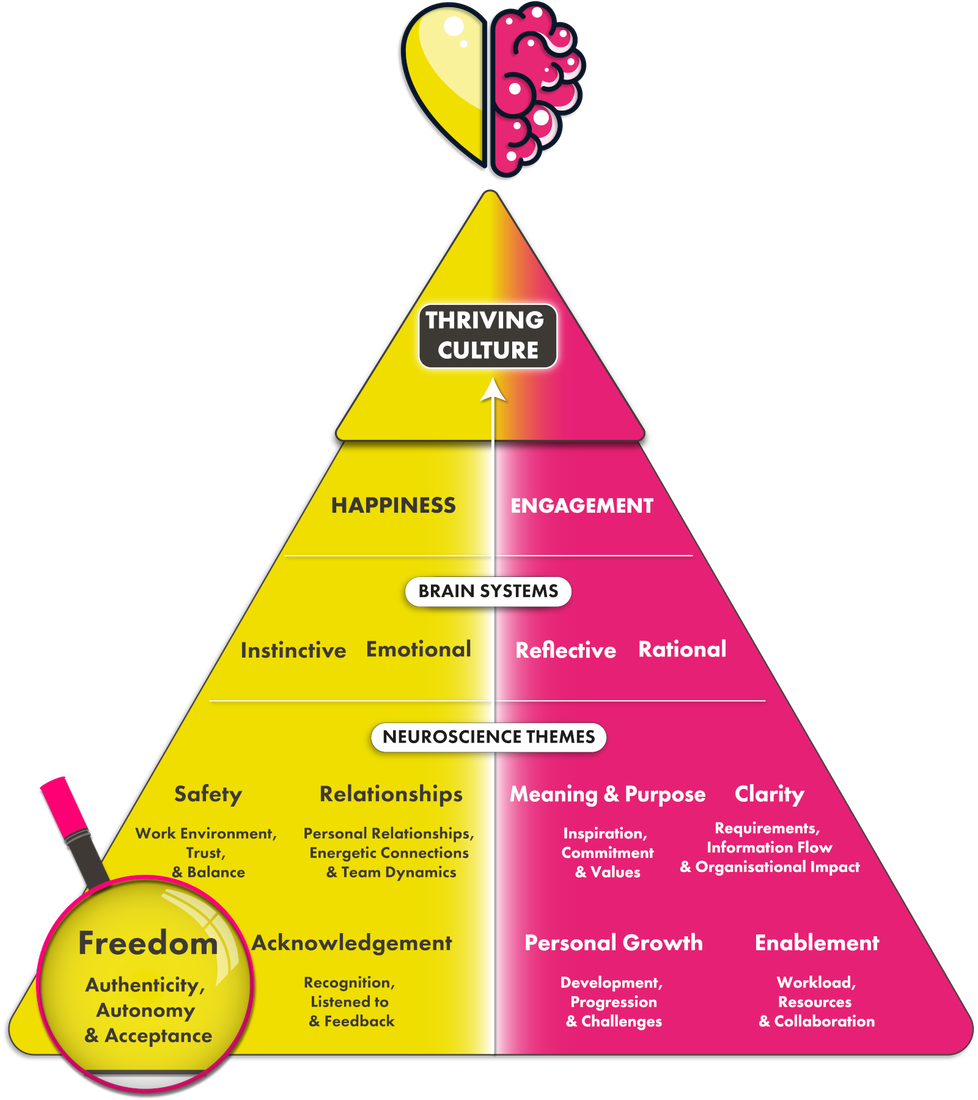Menu


Employee happiness can be linked to acceptance in the workplace. Acceptance is associated with the Instinctive brain system in our neuroscience model.
If you’ve just landed here, we recommend heading over to our brain systems and neuroscience themes pages for an introduction to our neuroscience model and methodology. Otherwise, read on to find out why acceptance is a vital component for workplace happiness.

If an employee is not feeling accepted and not feeling themselves, they won’t be able to perform, and ultimately they’ll want to leave. If you’re constantly trying to prove yourself as opposed to doing a good job, eventually, that can lead to burnout or sickness absence. Flip acceptance on its head and ask: “What’s the opposite of not feeling accepted”?
Freedom is the ability to be who we are. Most people have gone through their lives and never had the freedom to be who they are and show up authentically as themselves. Feeling accepted is a fundamental part of who we are. In any relationship, whether professional or personal, if we’re not feeling validated and accepted, then we begin to question ourselves. Are we good enough?
This, of course, has a huge impact on our wellbeing. We’re constantly trying to prove ourselves, which leads to burnout. Being in this constant state of proving ourselves becomes the norm. So we are putting this illness on ourselves to be accepted. But in reality, it’s the illness of the organisation that creates toxic and burnout cultures in which individuals must conform to the “norm” of being accepted. To flip this, we must create work environments where everyone is accepted regardless of who they are and embraced as their whole authentic selves.

Ensuring everyone feels safe to be themselves doesn’t happen overnight. But the onus is not on our people to feel safe, it’s on the leaders within the organisation to create the best possible environment for their teams to feel psychologically safe. If you have someone within the organisation that is struggling or bringing toxicity, then it’s up to the leaders to ask questions to figure out why this is happening. Is the environment not the right one for them? What is going on in their lives? People don’t feel this way for no reason. There is always an underlying problem.
During COVID, everyone was on a screen in their homes, we saw their families, pets, and living rooms. Everyone brought everything onto their screens. We told everyone to bring their whole selves to work, except if that part is negative or messy, we don’t want that part. If you are struggling because you are taking care of an elderly parent or young children, we don’t want to know about that. The truth is people have lives outside of work, they have a lot going on, so when you say you want them to bring their whole selves, then you need to support them wholly as well.
When hiring, organisations will say they want a cultural fit but, at the same time, say they want someone different who will bring in new ideas. However, when a person comes in who is not exactly like everyone else, they aren’t conformers and want to rock the boat in a respectful way- they’re not accepted. Things become difficult for them, and eventually, they will leave because they’re not being listened to and not being heard or validated.
However, at the onset, the organisation wanted someone different. They got the person they said they wanted with new ideas and unique approaches who is delivering what the company asked for, but their wellbeing is being harmed because they’re not accepted. If you are hiring for innovation, creativity, and change, then you need someone different. So embrace their differences and make them feel accepted.
Often people push back against change because it feels uncomfortable, even though that’s part of growth. It’s like growing pains in children; their little legs hurt so badly, but it’s painful because their bodies are growing. When we see someone going through an uncomfortable change, it is difficult to watch and can cause everlasting damage if they are not ready to change.
This can then cause trauma because they were put in a role in which they weren’t ready to tackle uncomfortable topics and changes. Acknowledge and accept that this is where they are and how they feel. Then ask what they need in order to move forward with the change so that they can benefit from and experience growth.
Inclusivity is great for everyone because it excludes no one and causes no harm. If you include someone, it doesn’t mean there’s less space for others. It’s not pie, there is enough to go around for everyone, and often the benefits will ripple out to the entire organisation. Generally, when you put things in place for people who are neurodivergent, for example, having an agenda or sending out the points after a meeting, that helps them, but it also helps everyone else too, so why wouldn’t you do it?
1) Start conversations about what it means to be accepted with your employees
Speak to your employees so that you can understand what acceptance means to them and how they feel accepted. There needs to be explicit transparency on both sides. Understand what impacts them because we are not all the same. People are impacted by several different things, they have different needs.
2) Act on what you hear to make people feel more accepted
When we understand what people need and do what we say we are going to do to support those needs, it validates them. These conversations of validation and doing what you say you’re going to do on a granular level are very important.
3) Write down what you learn and turn it into policy
Using the knowledge and understanding you gained in those conversations, craft a policy for the entire organisation that supports acceptance and belonging.
4) Always remember that kindness doesn’t cost anything
Caring costs nothing. You don’t have to be an expert to care about someone and validate them. Humanity is care; it’s about human leadership, giving people what they need, and not treating everyone the same because we’re all different
*This is an excerpt from the Happiness and Humans Podcast with Award Winning JEDI (Justice, Equity, Diversity & Inclusion) and UK Top 100 Influential Muslims 2022 Hannah Litt, Click here to listen to the full podcast.
Related articles
Get in touch for a quick chat with one of our experts to see how we can help you.
Take our benchmark to map where your organisation is now, and where it needs to be.